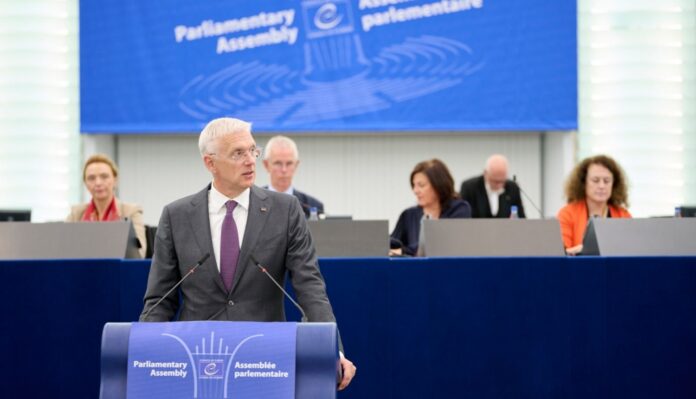On 11 October 2023 in Strasbourg, France, the Minister of Foreign Affairs of the Republic of Latvia, Krišjānis Kariņš, in his capacity of Chair of the Committee of Ministers of the Council of Europe, addressed the Parliamentary Assembly of the Council of Europe (PACE) to present information on what Latvia has accomplished during its Presidency of the Committee of Ministers of the Council of Europe. In his address, referring to the primary purpose of the establishment of the Council of Europe, Krišjānis Kariņš underlined the organisation’s vital role in the implementation of the fundamental European values – democracy, freedom, and the rule of law.
“We have been experiencing the emergence of new conflicts and the resurgence of old conflicts over the last few years. It is our common responsibility to remain standing firmly in favour of Europe’s fundamental values: democracy, freedom and the rule of law, since we see what the alternative is: aggression and war, which means human suffering and deaths,” Krišjānis Kariņš emphasised, pointing out that the Council of Europe, which is an essential part of democratic dialogue, plays an important role in safeguarding democratic values and human rights.
While emphasising the importance of the Council of Europe for strengthening of the standards of human rights and democracy, the Foreign Minister called on the organisation’s member states to remain united in providing their support to Ukraine, who is currently fighting not only for its own freedom but also for the freedom of Europe as a whole.
Russia will be held accountable for its crimes committed in the war against Ukraine, the Foreign Minister noted. Establishing the Register of Damage to record evidence of damage and loss caused to Ukraine as a result of the brutal war launched by Russia is one of the major achievements under the Latvian Presidency of the Council of Europe. We all still have to work together on setting up a special international tribunal, where the Russian leadership will stand trial for its crime of aggression against Ukraine, Krišjānis Kariņš stressed in his speech.
The Foreign Minister also accentuated the measures taken by the Latvian Presidency with the aim of promoting the strengthening of Ukraine’s justice system and finding solutions to the return of Ukrainian children unlawfully displaced by Russia.
In his dialogue with parliamentarians from the Council of Europe’s member states, the Minister addressed developments in Europe and focused in particular on the obligation of the member states to execute the judgments of the European Court of Human Rights.
As part of his visit to Strasbourg, Krišjānis Kariņš also met with the Council of Europe’s senior officials: the President of PACE, Martinus Josephus Maria (Tiny) Kox, and the Secretary General of the Council of Europe, Maria Pejčinović Burić. The parties gave credit to the Council of Europe’s support for the achievement of the objectives of the Latvian Presidency, notably its support to Ukraine. At the same time, Krišjānis Kariņš recalled the need to address the issue of employment of Russian citizens in the Council of Europe’s bodies, which cannot be tolerated after Russia’s expulsion from the organisation.
The Latvian Foreign Minister also has a meeting with the Deputy Prime Minister and Minister of Foreign Affairs of Kosovo, Donika Gërvalla-Schwarz, for a discussion on the security situation in the north of Kosovo and developments in the EU-led Belgrade-Pristina dialogue.
In an exchange with the Secretary of State of the Ministry of Foreign Affairs of Poland, Arkadiusz Mularczyk, current bilateral cooperation was discussed, especially in the education sector.

